|
|
|
Sort Order |
|
|
|
Items / Page
|
|
|
|
|
|
|
| Srl | Item |
| 1 |
ID:
119953
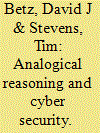

|
|
|
|
|
| Publication |
2013.
|
| Summary/Abstract |
This article is an attempt to interrogate some of the predominant forms of analogical reasoning within current cyber-security discourse, with a view to clarifying their unstated premises, major strengths and, vitally, points of conceptual failure. It seeks to improve dialogue between and across the various epistemic communities involved with cyber-security policy. As we seek to adapt to the new security realities of the information age, it is incumbent upon scholars and strategists to address the benefits of connectivity, in all its dimensions, as much as the threats it presents. Current cyber-security discourse channels us into a winner-takes-all modality that is neither desirable nor necessary in the current strategic reality.
|
|
|
|
|
|
|
|
|
|
|
|
|
|
|
|
| 2 |
ID:
175554
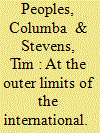

|
|
|
|
|
| Summary/Abstract |
As staples of science fiction, space technologies, much like outer space itself, have often been regarded as being ‘out there’ objects of international security analysis. However, as a growing subset of security scholarship indicates, terrestrial politics and practices are ever more dependent on space technologies and systems. Existing scholarship in ‘astropolitics’ and ‘critical astropolitics’ has tended to concentrate on how such technologies and systems underpin and impact the dynamics of military security, but this article makes the case for wider consideration of ‘orbital infrastructures’ as crucial to conceptions and governance of planetary security in the context of the ‘Anthropocene’. It does so by outlining and analysing in detail Earth Observation (EO) and Near-Earth Object (NEO) detection systems as exemplary cases of technological infrastructures for ‘looking in’ on and ‘looking out’ for forms of planetary insecurity. Drawing on and extending recent theorisations of technopolitics and of Large Technical Systems, we argue that EO and NEO technologies illustrate, in distinct ways, the extent to which orbital infrastructures should be considered not only part of the fabric of contemporary international security but as particularly significant within and even emblematic of the technopolitics of planetary (in)security.
|
|
|
|
|
|
|
|
|
|
|
|
|
|
|
|
| 3 |
ID:
093925
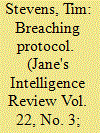

|
|
|
|
|
| Publication |
2010.
|
| Summary/Abstract |
China continues to invest in computer network operations, posing a cyberespionage threat. Tim Stevens investigates China's information warfare capabilities and its global implications.
|
|
|
|
|
|
|
|
|
|
|
|
|
|
|
|
| 4 |
ID:
168005
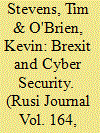

|
|
|
|
|
| Summary/Abstract |
Brexit is likely to have an effect on UK–EU cyber security cooperation. While there are ongoing reasons to be positive about the state of UK–EU cyber security, Tim Stevens and Kevin O’Brien show how Brexit will have negative impacts on cybercrime policing and cyber threat intelligence sharing, particularly in a ‘no-deal’ scenario, and argue that the absence of a negotiated settlement will damage the cyber security of the UK and the EU.
|
|
|
|
|
|
|
|
|
|
|
|
|
|
|
|
| 5 |
ID:
108175
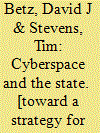

|
|
|
|
|
| Publication |
Abingdon, Routledge, 2011.
|
| Description |
158 p.
|
| Series |
Adelphi Series; 424
|
| Standard Number |
9780415525305
|
|
|
|
|
|
|
|
|
|
|
|
Copies: C:1/I:0,R:0,Q:0
Circulation
| Accession# | Call# | Current Location | Status | Policy | Location |
| 056302 | 044.67/BET 056302 | Main | On Shelf | General | |
|
|
|
|
| 6 |
ID:
112454
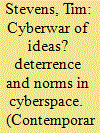

|
|
|
|
|
| Publication |
2012.
|
| Summary/Abstract |
This article relates American efforts to develop strategic 'cyber deterrence' as a means to deter adversarial actions in and through global cyberspace. Thus far, interests- based cyber deterrence theory has failed to translate into effective American policy and strategy, due to a divergence between the operational idiosyncrasies of cyberspace and an over-reliance on Cold War models of deterrence. Even while explicit cyber deterrence strategy falters, the United States is pursuing a normsbased approach to cyber strategy generally, and hopes to derive deterrent effects from its attempts to broker international agreements pertaining to the 'rules of the road' for the proper and productive use of cyberspace. The United States is not the only norm entrepreneur in this policy space, however, and this article examines how a range of other state and non-state actors are complicating efforts to develop normative regimes that might reduce risks to and from cyberspace. The article concludes that a norms-based approach to cyber deterrence might engender deterrent effects at the state level but is unlikely to do so in the case of 'rogue' states and many non-state actors. States will continue, therefore, to develop punitive deterrence capabilities to respond to these actors.
|
|
|
|
|
|
|
|
|
|
|
|
|
|
|
|
| 7 |
ID:
159791
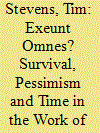

|
|
|
|
|
| Summary/Abstract |
John H. Herz (1908-2005) is better known for his theorisation of the security dilemma than for his conviction that human survival is threatened by the conditions of late modernity. This article explores extinction and survival in his work to interrogate his persistent characterisation as an incorrigible pessimist. In his preoccupation with extinction, Herz would seem a first-rank pessimist, but his intellectual commitments belie this easy categorisation. Specifically, his appeals to interdisciplinary ‘survival research’ suggest a qualified pessimism that does not foreclose on the potential of humankind to overcome structural, political and normative obstacles. This is consistent with current understandings of pessimism within the broader realist tradition. Herz expressed an ‘open’ and ‘linear’ temporality that challenges cyclical and linear-progressive temporalities inherent to realism and liberalism, respectively. Herz articulates, therefore, a ‘productive pessimism’ that charts a different path for pessimist thought beyond its pejorative connotations. This article contributes to the literature on classical realism, to a growing interest in Herz’s intellectual legacy, and to the developing appreciation of time and temporality in International Relations theory and practice. It also provides a foundation for rethinking our assumptions about pessimism and international politics.
|
|
|
|
|
|
|
|
|
|
|
|
|
|
|
|
| 8 |
ID:
174247
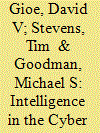

|
|
|
|
|
| Summary/Abstract |
THE EMERGENCE OF GLOBAL HYPERCONNECTIVITY through computer networks has occasioned much marvel, reflection, and commentary on its implications for everything from “just‐in‐time” supply chain management to the Internet of Things. These developments are also consequential in national security and intelligence. What must objectively be seen as technological progress has also sparked debates that would have been unimaginable half a century ago, and in fields far beyond computer and political sciences. The desire to protect informational assets from theft, subversion, and degradation and questions about how to exploit networked computing for strategic gain have spurred remarkable developments in intelligence collection, policy, doctrine, law, strategy, and even ethical norms. There are active debates about how cyber considerations affect each field touched by them, and it seems that there remain more unsettled than settled questions about cyber power as a lever of statecraft in the twenty‐first century.
|
|
|
|
|
|
|
|
|
|
|
|
|
|
|
|
| 9 |
ID:
156022
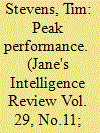

|
|
|
| 10 |
ID:
087913
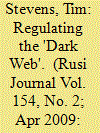

|
|
|
|
|
| Publication |
2009.
|
| Summary/Abstract |
The internet plays a contributory role in radicalisation, but is only one of a number of mechanisms currently deployed to win recruits to global jihad. Technical regulation of online content is difficult and may be counter-productive, driving forums deeper underground or alienating users. Tim Stevens argues that adopting a social approach that educates and empowers online communities could have more success.
|
|
|
|
|
|
|
|
|
|
|
|
|
|
|
|
| 11 |
ID:
141299
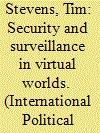

|
|
|
|
|
| Summary/Abstract |
Virtual worlds, persistent online spaces of social interaction and emergent gameplay, have hitherto been neglected in International Studies. Documents disclosed by Edward Snowden in December 2013 suggest that intelligence agencies, including the US National Security Agency and the British Government Communications Headquarters (GCHQ), have been less reticent in exploring and exploiting these environments for signals and human intelligence. This article introduces virtual worlds as sociological sites in the matrix of international politics and explores how the intelligence community (IC) has conducted operations in these environments, principally for counterterrorism purposes. Reconstructing the activities of the IC shows how virtual worlds have been drawn into the ambit of state surveillance practices, particularly as a means to generate intelligence from virtual-world behaviors that correlate with, and predict, “real-world” behaviors indicative of terrorism and other subversive activities. These intelligence activities portend a general colonization by the state of previously unregulated interstices of the sociotechnical Internet and their analysis contributes to our understanding of the relationship between government and the Internet in the early twenty-first century.
|
|
|
|
|
|
|
|
|
|
|
|
|
|
|
|
|
|
|
|
|